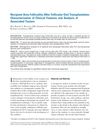 29 citations,
June 2013 in “Journal of the Saudi Society of Dermatology & Dermatologic Surgery”
29 citations,
June 2013 in “Journal of the Saudi Society of Dermatology & Dermatologic Surgery” Alopecia areata is an autoimmune hair loss condition treated with corticosteroids, and histologic confirmation is the best diagnosis method.
 29 citations,
January 2007 in “Dermatologic Clinics”
29 citations,
January 2007 in “Dermatologic Clinics” Photodynamic Therapy is an effective treatment for mild to severe acne.
 29 citations,
March 2001 in “Clinics in Dermatology”
29 citations,
March 2001 in “Clinics in Dermatology” Steven Kossard classified lymphocyte-related hair loss into four patterns, each linked to different types of baldness.
 28 citations,
December 2019 in “Skin appendage disorders”
28 citations,
December 2019 in “Skin appendage disorders” Some medications might reverse gray hair, especially those that reduce inflammation or stimulate pigment production, and vitamin B might help.
 27 citations,
April 2018 in “Journal of autoimmunity”
27 citations,
April 2018 in “Journal of autoimmunity” iNKT cells can help prevent and treat alopecia areata by promoting hair regrowth.
 26 citations,
May 2014 in “BioEssays”
26 citations,
May 2014 in “BioEssays” Using neurohormones to control keratin can lead to new skin disease treatments.
 25 citations,
October 2018 in “Journal of The American Academy of Dermatology”
25 citations,
October 2018 in “Journal of The American Academy of Dermatology” Erosive pustular dermatosis of the scalp is a type of skin inflammation often confused with other conditions, requiring continuous treatment.
 25 citations,
June 2018 in “Clinical and Experimental Dermatology”
25 citations,
June 2018 in “Clinical and Experimental Dermatology” Combined microneedling and minoxidil improves hair growth more than minoxidil alone.
 25 citations,
November 2014 in “Ageing Research Reviews”
25 citations,
November 2014 in “Ageing Research Reviews” Skin aging is caused by stem cell damage and can potentially be delayed with treatments like antioxidants and stem cell therapy.
 24 citations,
January 2020 in “International Journal of Molecular Sciences”
24 citations,
January 2020 in “International Journal of Molecular Sciences” Some plants with flavonoids may help treat hair loss and promote hair growth.
 24 citations,
June 2018 in “Reviews in endocrine and metabolic disorders”
24 citations,
June 2018 in “Reviews in endocrine and metabolic disorders” Thyroid diseases may contribute to autoimmune skin diseases, and more research is needed on their relationship.
 19 citations,
August 2019 in “Expert Opinion on Therapeutic Targets”
19 citations,
August 2019 in “Expert Opinion on Therapeutic Targets” New treatments for hair loss may target specific pathways and generate new hair follicles.
 19 citations,
August 2019 in “Seminars in Plastic Surgery”
19 citations,
August 2019 in “Seminars in Plastic Surgery” Platelet-rich plasma is beneficial in various plastic surgery applications, but more research is needed to standardize its use.
 19 citations,
January 2015 in “Current problems in dermatology”
19 citations,
January 2015 in “Current problems in dermatology” Ultraviolet rays damage hair, smoking may cause hair loss, and good nutrition is important for hair health, but genetics mainly decide hair thickness.
 18 citations,
September 2017 in “Clinics in Dermatology”
18 citations,
September 2017 in “Clinics in Dermatology” Obesity is linked to various skin disorders, which can help with early diagnosis and prevention of long-term health issues.
 17 citations,
September 2012 in “Dermatologic Clinics”
17 citations,
September 2012 in “Dermatologic Clinics” The conclusion is that accurate diagnosis of different types of hair loss requires careful examination of tissue samples and understanding of clinical symptoms.
 17 citations,
December 2001 in “Dermatologic therapy”
17 citations,
December 2001 in “Dermatologic therapy” Different treatments for alopecia areata have unpredictable results and varying success rates.
 16 citations,
September 2018 in “Journal of Ethnopharmacology”
16 citations,
September 2018 in “Journal of Ethnopharmacology” Plant-based remedies may treat hair loss by reducing inflammation and improving insulin resistance.
 16 citations,
July 2012 in “Current pharmaceutical biotechnology”
16 citations,
July 2012 in “Current pharmaceutical biotechnology” New treatments for skin conditions related to the sebaceous gland are being developed based on current research.
 16 citations,
July 1996 in “Dermatologic Clinics”
16 citations,
July 1996 in “Dermatologic Clinics” Some psychiatric drugs can cause skin problems, but serious reactions are rare.
 15 citations,
April 2003 in “Journal of dermatology”
15 citations,
April 2003 in “Journal of dermatology” Alopecia areata causes hair loss due to an immune attack on hair follicles, influenced by genetics and environment.
 13 citations,
November 2005 in “Veterinary Dermatology”
13 citations,
November 2005 in “Veterinary Dermatology” A dog's skin calcification condition resolved without treatment after a bacterial infection.
 12 citations,
November 2003 in “Journal of the American Academy of Dermatology”
12 citations,
November 2003 in “Journal of the American Academy of Dermatology” Topical diphencyprone helped regrow hair in mice and rats with a condition similar to human hair loss.
 11 citations,
June 2022 in “Frontiers in immunology”
11 citations,
June 2022 in “Frontiers in immunology” New protein changes may be involved in the immune attack on hair follicles in alopecia areata.
 11 citations,
July 2010 in “Dermatologic Surgery”
11 citations,
July 2010 in “Dermatologic Surgery” Postoperative folliculitis after hair transplants is a minor issue that doesn't relate to patient details or how much hair is transplanted.
 10 citations,
December 2021 in “Frontiers in cell and developmental biology”
10 citations,
December 2021 in “Frontiers in cell and developmental biology” Glypican-1 is important for blood vessel growth in hair follicles and could help treat hair loss.
 9 citations,
June 2003 in “Veterinary dermatology”
9 citations,
June 2003 in “Veterinary dermatology” Boxer dogs may have a genetic skin condition that worsens seasonally and can be treated with certain medications.
 8 citations,
February 2020 in “Aesthetic Surgery Journal”
8 citations,
February 2020 in “Aesthetic Surgery Journal” Adding cells to fat grafts improves hair regrowth in early baldness, but effects lessen over time.
 8 citations,
November 2017 in “Journal of Investigative Dermatology”
8 citations,
November 2017 in “Journal of Investigative Dermatology” AGA linked to inflammation, stress, fibrosis, and disturbed hair follicle stem cells.
 8 citations,
January 2016 in “European Journal of Plastic Surgery”
8 citations,
January 2016 in “European Journal of Plastic Surgery” PRGF treatment is safer and more effective for hair loss than topical minoxidil.






























